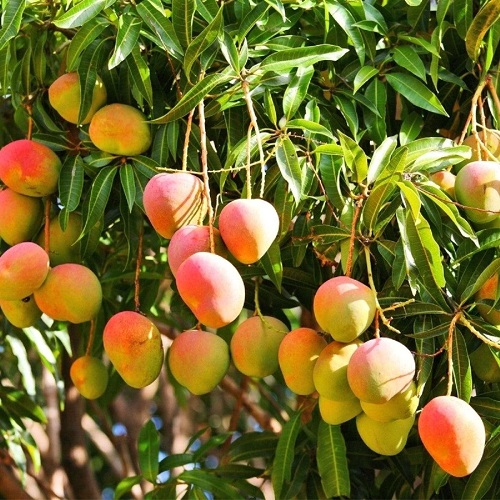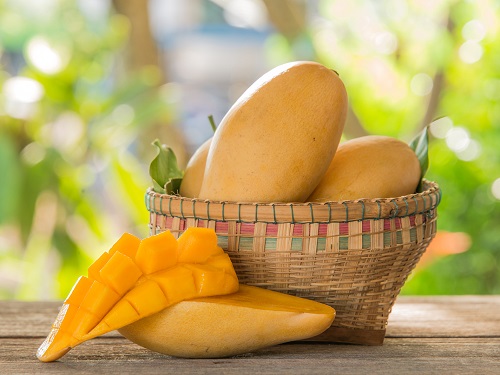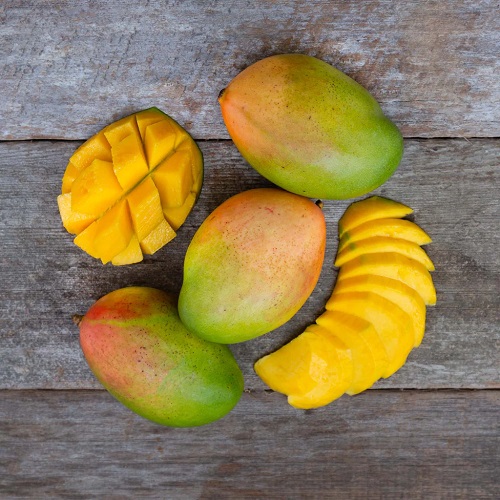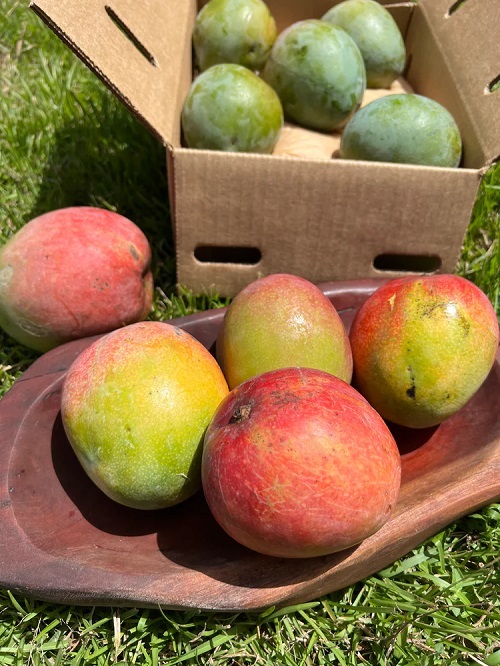We bring you the most Sweetest Mango Varieties that you can grow in your garden for an exceptional sugary experience!
Imagine biting into a mango so sweet, it’s like nature’s candy—an explosion of succulent juices and unparalleled flavor that transports you to a sun-soaked paradise with every bite. Whether you’re a mango aficionado or a curious newcomer, get ready to discover the sweetest mango varieties that are sure to redefine your fruit-eating experience.
Have a look at the different types of mangoes in the world here
Sweetest Mango Varieties
1. Alphonso
Native Place: India
Taste Profile: Exceptionally sweet with notes of citrus and peach.
Pulp’s Texture: Smooth, creamy, and devoid of fibrous strands.
What Makes it Sweet: High sugar content and a balance of complex flavor compounds.
Popular as the “King of Mangoes,” these one of the sweetest mango varieties hail from India. They have a smooth, buttery texture and taste great both as raw and in juices.
2. Honey Mango
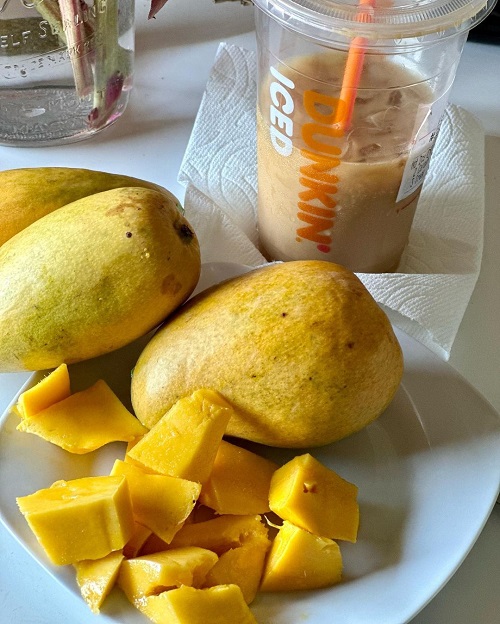
Native Place: Philippines
Taste Profile: Rich sweetness accompanied by hints of coconut and vanilla.
Pulp’s Texture: Buttery and smooth, almost velvety.
What Makes it Sweet: High levels of fructose and natural sugars.
The Honey Mango, also famouas as the “Manggang Kalabaw,” lives up to its name with its sweet, honey-like taste. It’s a small, oval- mango variety with a distinctive sweet aroma.
3. Ataulfo
Native Place: Mexico
Taste Profile: Rich sweetness accompanied by hints of coconut and vanilla.
Pulp’s Texture: Buttery and smooth, almost velvety.
What Makes it Sweet: High levels of fructose and natural sugars.
These sweetest mango varieties are a favorite for snacking and making desserts due to their rich flavor and minimal fiber content.
Here’s all about growing mangoes in a pot
4. Keitt
Native Place: United States
Taste Profile: Subtly sweet with a slight tanginess.
Pulp’s Texture: Juicy and fiber-free.
What Makes it Sweet: Its late-season harvest allows for maximum sugar development.
The Keitt mango has a its vibrant green skin even when ripe. It is great for eating eaw and is also perfect for making smoothies.
5. Kent
Native Place: Ecuador
Taste Profile: Sweet and rich with tropical notes of pineapple and berry.
Pulp’s Texture: Smooth and buttery.
What Makes it Sweet: Balanced sweetness achieved from a diverse range of natural sugars.
The Kent mango has a sweet and slightly tangy flavor. It stands oit by its reddish-green skin and juicy, fiberless flesh.
6. Manila Mango
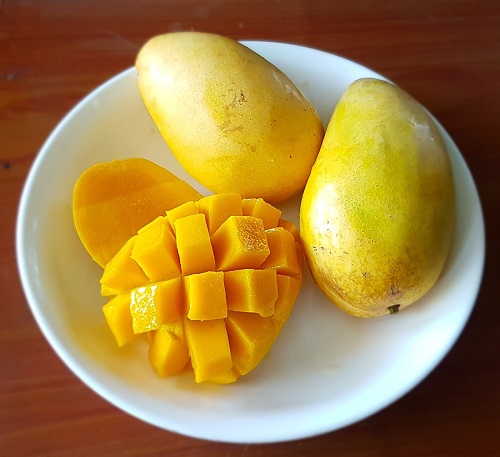
Native Place: Philippines
Taste Profile: Sweet with nuances of apricot and peach.
Pulp’s Texture: Fine, creamy, and fiberless.
What Makes it Sweet: Predominantly high sugar content.
This small, kidney-like mango is incredibly sweet and has a smooth, fiberless texture. It’s a popular dessert option and is enjoyed fresh or used in various Filipino dishes.
7. Carrie
Native Place: Florida, USA
Taste Profile: Intense sweetness with hints of spice.
Pulp’s Texture: Smooth and fiber-free.
What Makes it Sweet: Elevated levels of sweetness owing to its unique genetic makeup.
Carrie mangoes are famous for their sweet, rich flavor with a hint of spice. They have a juicy, fiberless flesh that makes them ideal for slicing and eating fresh.
Is mango a citrus or a stone fruit? Find out here
8. Francis

Native Place: Haiti
Taste Profile: Sweet and spicy with a citrus undertone.
Pulp’s Texture: Slightly fibrous but juicy.
What Makes it Sweet: High fructose levels combined with a balanced flavor profile.
The Francis mango is popular for its sweet, tropical flavor. It has yellow skin with green overtones and a smooth, fiberless interior.
9. Bombay Mango
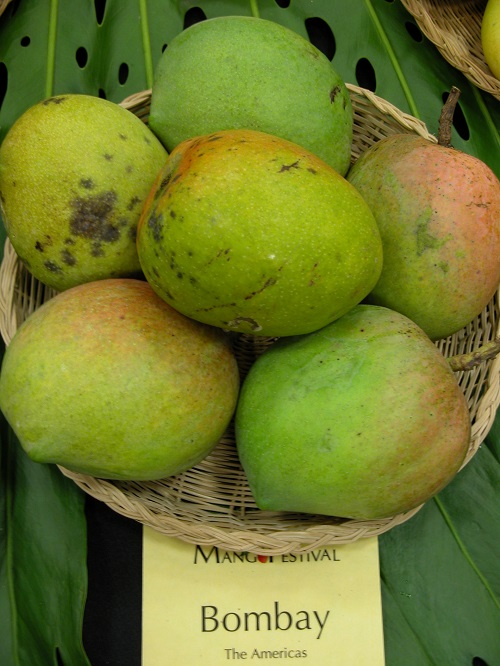
Native Place: India
Taste Profile: Exotic sweetness with floral notes.
Pulp’s Texture: Juicy and moderately fibrous.
What Makes it Sweet: Complex sugar and acid balance, enriched by its Indian origins.
Bombay mangoes, also known as “Safeda,” locally and have a are sweet and slightly tangy. They are often used in Indian desserts and are a favorite for making mango lassi.
10. Palmer
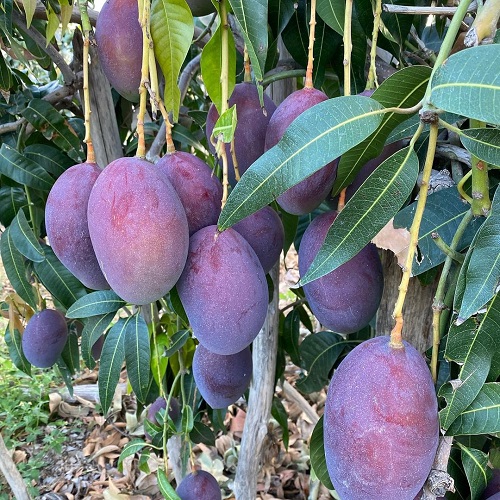
Native Place: Florida, USA
Taste Profile: Mildly sweet with tropical hints.
Pulp’s Texture: Juicy and tender.
What Makes it Sweet: Late harvesting ensures high sugar concentration.
Palmer mangoes are juicy with minimal fiber. They are often enjoyed fresh and make excellent additions to fruit salads and salsas.
11. Nam Doc Mai
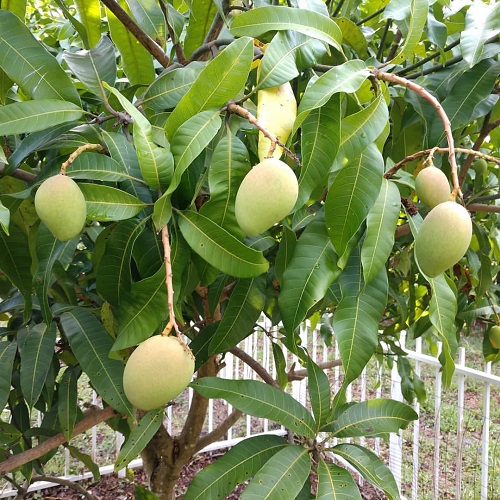
Native Place: Thailand
Taste Profile: Extremely sweet with honey-like notes.
Pulp’s Texture: Silky and smooth.
What Makes it Sweet: Thai origins bring a unique sugar profile.
This Thai mango is prized for its exceptionally sweet, fragrant, and non-fibrous flesh. It’s often eaten fresh or used in Thai cuisine.
12. Valencia Pride
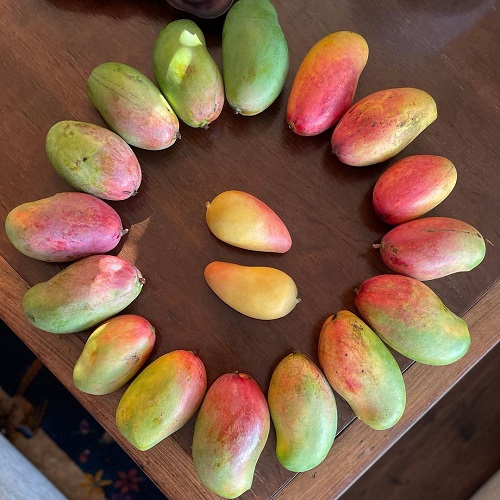
Native Place: Florida, USA
Taste Profile: Sweet with a tinge of tartness.
Pulp’s Texture: Smooth and fiberless.
What Makes it Sweet: Extended ripening period allows sugars to develop fully.
Valencia Pride mangoes are popular for their aromatic flavor and low fiber content. They are a good choice for shakes and raw consumption.
13. Glenn

Native Place: Florida, USA
Taste Profile: Sweet and peachy.
Pulp’s Texture: Creamy with minimal fiber.
What Makes it Sweet: Its Floridian origins contribute to its unique sweetness.
The Glenn mango boasts a fruity taste with a hint of citrus. These sweetest mango varieties stand out for their meaty flesh.
14. Cogshall
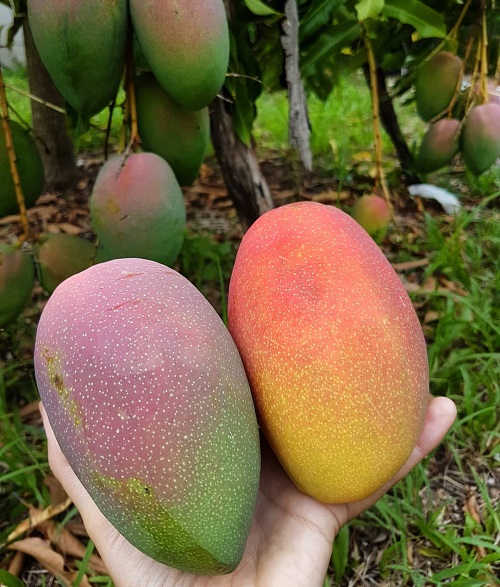
Native Place: Florida, USA
Taste Profile: Moderately sweet with tropical notes.
Pulp’s Texture: Slightly granulated but juicy.
What Makes it Sweet: High sugar to acid ratio.
Cogshall mangoes are sweet with a rich, tropical flavor. They are small to medium-sized and make for a delightful snack.
15. Amrapali
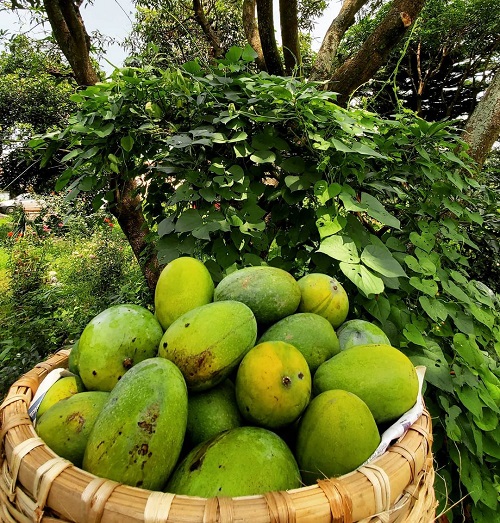
Native Place: India
Taste Profile: Sweet and tangy with notes of citrus.
Pulp’s Texture: Soft and nearly fiber-free.
What Makes it Sweet: A hybrid origin contributing to a high sugar content.
Amrapali mangoes are juicy, with a unique flavor that combines notes of sweetness and acidity. They are commonly used in Indian cuisine.
16. Kesar
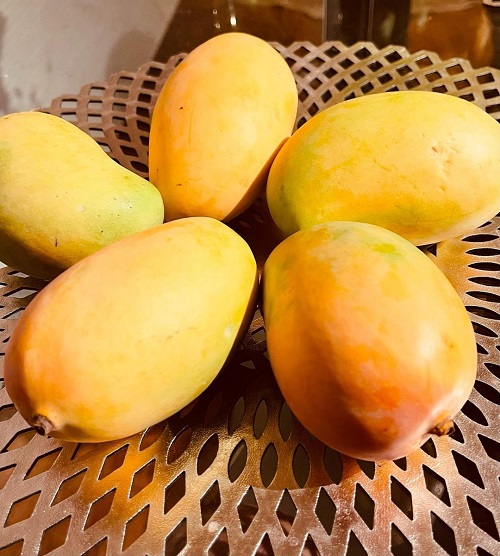
Native Place: India
Taste Profile: Sweet with a saffron aroma.
Pulp’s Texture: Smooth and buttery.
What Makes it Sweet: Indian origins yield a high concentration of natural sugars.
Kesar mangoes are famous for their saffron-like aroma and sweet taste. They are often used in Indian sweets and desserts.
17. Maha Chanok
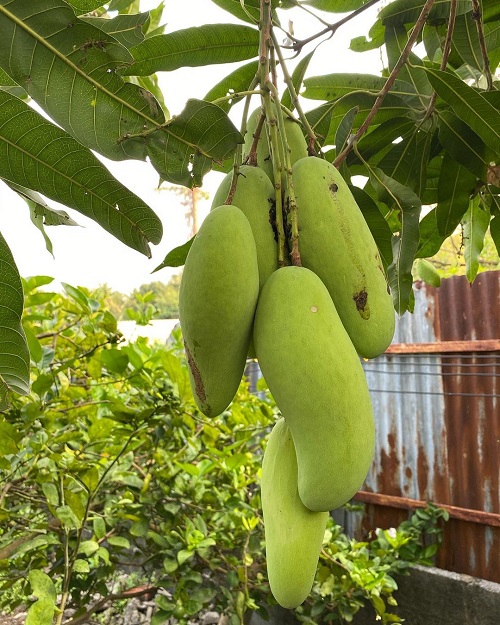
Native Place: Thailand
Taste Profile: Exceptionally sweet with hints of peach and tropical fruits.
Pulp’s Texture: Creamy and non-fibrous.
What Makes it Sweet: Thai breeding offers unique sweetness characteristics.
Maha Chanok mangoes are sweet with a floral aroma. They have a unique, elongated shape and are a prized Thai variety.
18. Haden
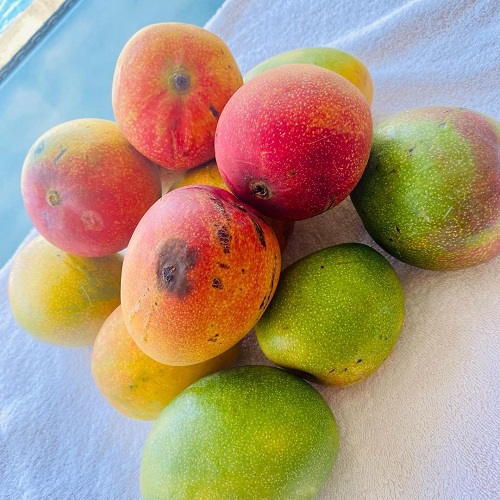
Native Place: Florida, USA
Taste Profile: Sweet and aromatic with floral undertones.
Pulp’s Texture: Juicy but slightly fibrous.
What Makes it Sweet: Early season variety with a strong natural sweetness.
Haden mangoes are sweet and tangy, with a rich, tropical flavor. They are one of the first mango varieties to be commercially grown in the United States.
19. White Chaunsa
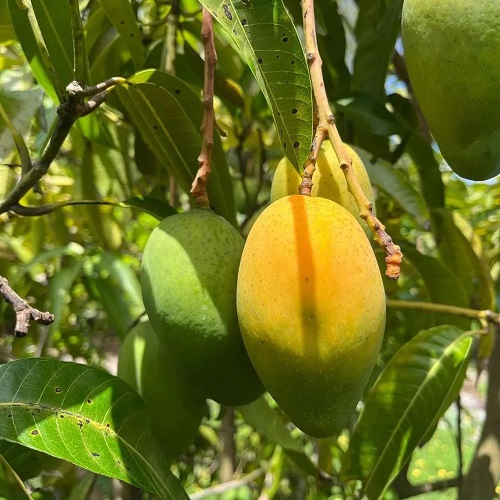
Native Place: Pakistan
Taste Profile: Extremely sweet with a subtle tartness.
Pulp’s Texture: Smooth and fiber-free.
What Makes it Sweet: Native to Pakistan, it’s renowned for its high sugar levels.
The White Chaunsa mango is exceptionally sweet and has a creamy texture. It’s a favorite in Pakistan and is often exported worldwide.
20. Irwin
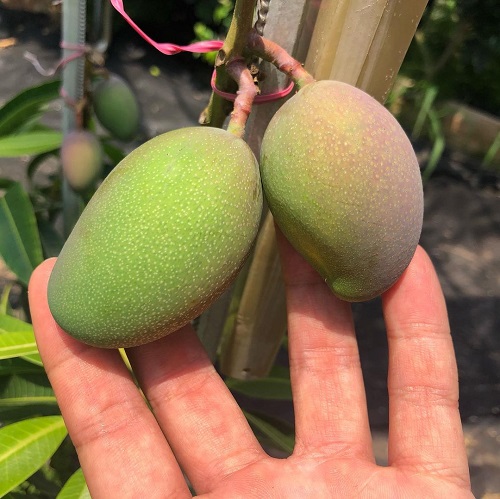
Native Place: Florida, USA
Taste Profile: Balanced sweetness with a slight tart kick.
Pulp’s Texture: Smooth and very juicy.
What Makes it Sweet: A rich balance of sugars and acids makes it delectably sweet.
Irwin mangoes are sweet, juicy, and slightly tangy. They are popular for eating fresh and for use in mango-based desserts.

